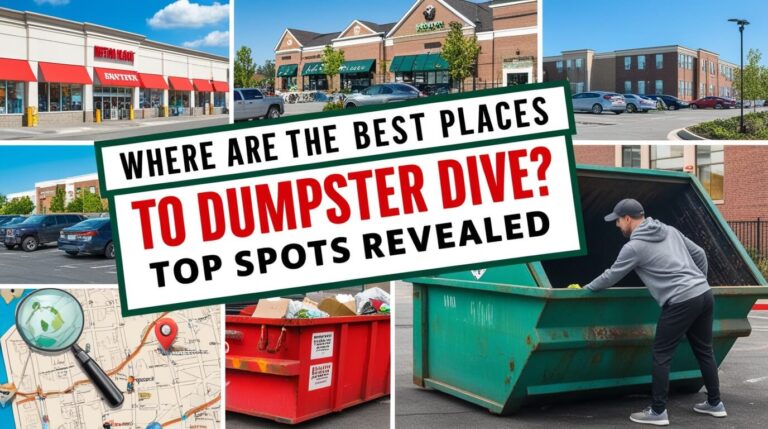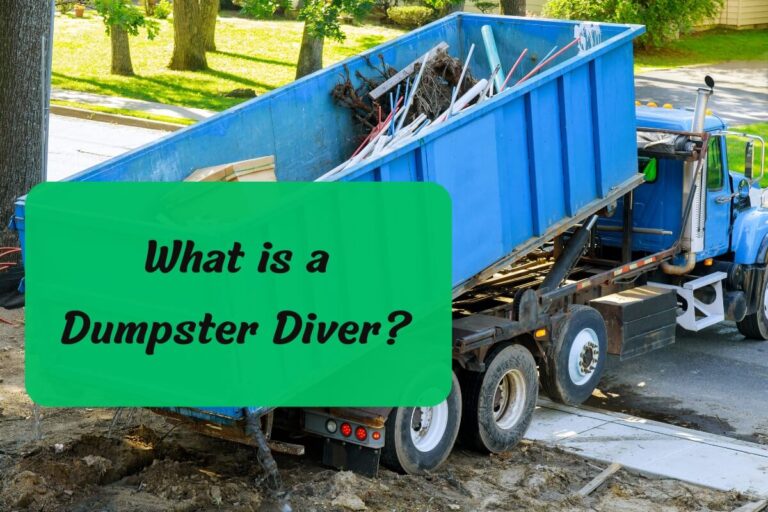
In today’s world of overconsumption and wastefulness, an unconventional practice has emerged – dumpster diving. The act of rummaging through dumpsters or trash bins in search of discarded yet usable items may seem bizarre to some, but for others, it’s a way of life. Dumpster diving has been around for decades, with its roots tracing back to the Great Depression era when people had to get resourceful to survive.
As our society becomes more conscious of its environmental impact and the staggering amount of waste produced, dumpster diving has gained newfound attention. Some view it as a desperate measure taken by those in poverty, while others see it as an eco-friendly and cost-saving lifestyle choice.
But the question remains: Is dumpster diving worth it? The short answer is: that it depends on your circumstances, values, and risk tolerance.
This guide explores the practice’s legal, financial, and ethical aspects. Learn what you might find, the risks involved, and how to stay safe. Discover if dumpster diving aligns with your values and if it’s right for you.
What Exactly is Dumpster Diving?
Dumpster diving, also known as bin diving or skip dipping, refers to the practice of salvaging reusable or valuable items from dumpsters, trash cans, or other disposal units. It’s a form of urban foraging that has been embraced by various groups, including environmentalists, frugal individuals, and those living in poverty.
The process of dumpster diving typically involves rummaging through dumpsters, sorting through the discarded items, and carefully selecting those that are still functional or have value. It’s a method of repurposing and extending the life cycle of goods that would otherwise end up in landfills or incinerators.
Some of the most commonly found items during dumpster diving expeditions include:
- Food: Unexpired or slightly past-date packaged foods, produce, baked goods, and canned items.
- Clothing and accessories: Gently used or even brand-new apparel, shoes, bags, and jewelry.
- Furniture and household items: Couches, chairs, tables, kitchenware, decorative pieces, and small appliances.
- Electronics: Computers, laptops, phones, speakers, televisions, and other gadgets that may only require minor repairs.
- Books and magazines: Slightly damaged or overstocked reading materials.
- Art and craft supplies: Paints, canvases, fabrics, and other creative materials.
Dumpster diving has legal and ethical implications that you need to understand before doing it.
Is Dumpster Diving Legal?
The legality of dumpster diving is a complex and often misunderstood topic. In the United States, there is no federal law explicitly prohibiting or permitting dumpster diving. However, the laws and regulations surrounding this activity vary greatly from state to state and even between different cities and municipalities.
In general, the legality of dumpster diving hinges on several factors, including:
- Property Ownership: Dumpsters located on private property, such as those behind businesses or apartment complexes, are considered private property. Accessing these dumpsters without permission could be considered trespassing, which is generally illegal.
- Local Ordinances: Some cities and counties have specific ordinances that prohibit or regulate dumpster diving. These ordinances may impose fines or other penalties for those caught engaging in this activity.
- Theft Laws: While dumpster diving itself is not considered theft, taking items of significant value from a dumpster could potentially be interpreted as theft, depending on the circumstances and local laws.
It’s crucial to familiarize yourself with the laws and regulations in your area before engaging in dumpster diving. Seeking legal advice or consulting with local authorities can help you understand the specific rules and potential risks in your community.
Despite the legal uncertainties, many dumpster divers continue to practice this activity, often taking precautions to avoid legal troubles. Some argue that once an item has been discarded and placed in a dumpster, it should be considered abandoned property and fair game for anyone to take.
Benefits of Dumpster Diving
While dumpster diving may seem unappealing to some, it offers a range of benefits that can be compelling for those willing to embrace this unconventional lifestyle. Two of the most significant advantages are financial savings and environmental sustainability.
Financial Benefits
One of the primary motivations for dumpster diving is the potential to save a substantial amount of money. By salvaging items that would otherwise be discarded, dumpster divers can acquire a wide range of goods, from food and clothing to furniture and electronics, at little to no cost.
Consider these real-life examples of the financial benefits of dumpster diving:
- Food Savings: In 2018, a dumpster diver in New York City reported feeding her entire community with discarded meat and produce, saving thousands of dollars in grocery costs.
- Furniture Finds: A couple in Madison, Wisconsin, rented a truck during the city’s “Hippie Christmas” (when leases expire, and people discard unwanted goods) and filled it with furniture and household items, saving them from spending hundreds or even thousands of dollars on new items.
- Reselling Opportunities: Some dumpster divers have turned their finds into a profitable side hustle. One TikTok user, known as @sweetthriftlife, earns up to $1,000 per month by reselling items she finds in dumpsters, such as baby strollers, air fresheners, and car seats.
By embracing dumpster diving, individuals and families can significantly reduce their living expenses, freeing up funds for other necessities or saving for long-term goals.
Environmental Benefits
In addition to financial savings, dumpster diving plays a crucial role in reducing waste and promoting sustainability. The staggering amount of waste generated by our society, particularly in developed countries, has severe environmental consequences, including greenhouse gas emissions, pollution, and the depletion of natural resources.
According to the Environmental Protection Agency (EPA), in 2018, landfills in the United States received approximately 11.3 million tons of textiles, including clothing, furniture, and other non-durable goods. Additionally, the Food and Agriculture Organization estimates that if food waste were a country, it would be the third-largest emitter of carbon dioxide in the world, behind only China and the United States.
By rescuing items from dumpsters and extending their lifespan, dumpster divers are actively reducing the amount of waste sent to landfills and incinerators. This practice aligns with the principles of the circular economy, where resources are kept in use for as long as possible, minimizing the need for new production and extraction of raw materials.
Dumpster diving not only diverts usable items from the waste stream but also raises awareness about the issue of excessive consumerism and waste. As more people embrace this practice, it can potentially inspire others to adopt more sustainable lifestyles and advocate for policies that prioritize waste reduction and resource conservation.
Risks and Downsides of Dumpster Diving
While dumpster diving offers financial and environmental benefits, it is not without its risks and downsides. It’s essential to carefully consider these factors before deciding if this practice is right for you.
Health and Safety Concerns
One of the most significant risks associated with dumpster diving is the potential for injury or exposure to hazardous materials. Dumpsters can contain sharp objects, broken glass, or other dangerous items that could cause cuts, punctures, or other injuries. Additionally, dumpsters may harbor harmful bacteria, mold, or even disease-carrying pests like rats or insects.
When it comes to food safety, dumpster diving can be risky if proper precautions are not taken. Consuming expired or contaminated food from dumpsters can lead to foodborne illnesses, which can range from mild discomfort to severe health complications.
To mitigate these risks, dumpster divers should take the following precautions:
- Wear appropriate protective gear, such as gloves, sturdy shoes, and long-sleeved clothing.
- Avoid dumpsters that appear to contain hazardous materials or biohazards.
- Carefully inspect food items for signs of spoilage, contamination, or damage before consuming or handling them.
- Practice proper hygiene, including washing hands thoroughly after dumpster diving and sanitizing any recovered items.
Legal Liabilities
As mentioned earlier, the legality of dumpster diving is a complex issue, and engaging in this activity can potentially expose individuals to legal liabilities. Trespassing on private property, theft accusations, and fines or penalties for violating local ordinances are among the potential legal risks.
Even if dumpster diving is technically legal in your area, confrontations with property owners, employees, or law enforcement can still arise. These encounters can be unsettling and may escalate into more serious situations if not handled appropriately.
The Psychological and Social Stigma
Beyond the physical risks and legal concerns, dumpster diving also carries a significant psychological and social stigma. Many people view this practice as undignified, unsanitary, or even shameful, associating it with poverty or desperation.
For some individuals, the fear of being judged or ridiculed can be a deterrent from engaging in dumpster diving, even if they recognize its potential benefits. This stigma can also strain relationships with family or friends who may not understand or approve of this lifestyle choice.
Finding and sorting dumpster treasures takes time and effort, which could be spent on other ways to make money.
Each individual must weigh risks and rewards and align with their values and circumstances.
Tips for Successful and Ethical Dumpster Diving
If you’ve carefully considered the pros and cons and decided to embark on the dumpster diving journey, there are several tips and best practices to ensure a successful, safe, and ethical experience.
Where to Look
Not all dumpsters are created equal, and some locations are more fruitful than others. Here are some of the best places to start your dumpster diving adventures:
- Grocery Stores: These are prime spots for finding discarded food items, including produce, baked goods, and packaged foods that are still edible but have reached their sell-by dates.
- Retail Stores: Clothing stores, electronics retailers, and home goods stores often discard unsold or slightly damaged merchandise, providing opportunities to find high-value items.
- College Campuses: During move-out periods, students often discard furniture, appliances, and other household items, making dorm dumpsters a goldmine for dumpster divers.
- Affluent Neighborhoods: Wealthier areas may yield higher-end discarded items, such as designer clothing, luxury furniture, or expensive electronics.
Finding frequently used dumpsters and observing patterns and schedules can help you dive at the right time.
When is the Best Time to Go?
Timing is crucial when it comes to dumpster diving. Generally, the best times to dive are shortly after businesses have closed or on days when they are likely to discard items. Here are some tips on optimal timing:
- Grocery Stores: Late evenings or early mornings, when fresh produce and baked goods are being replaced.
- Retail Stores: Immediately after major holidays, sales, or inventory clearances, when unsold merchandise is likely to be discarded.
- Residential Areas: On bulk trash pickup days or during move-out periods for college students or apartment complexes.
It’s also essential to consider safety and avoid confrontations. Diving at night or during off-peak hours can reduce the chances of being noticed or interrupted.
What to Take and What to Leave
While dumpster diving can yield valuable finds, it’s crucial to exercise discretion and judgment when deciding what to take and what to leave behind. Here are some general guidelines:
- Inspect for Damage: Carefully examine items for signs of damage, leaks, or contamination. If an item appears to be in poor condition or poses a potential health risk, it’s best to leave it behind.
- Check Expiration Dates: When it comes to food items, always check expiration dates and avoid anything that appears spoiled or past its prime.
- Respect Privacy: Never take personal items, such as documents, photographs, or other items containing sensitive information.
- Only Take What You Need: Be mindful of your actual needs and avoid taking more than you can reasonably use or repurpose.
By following these guidelines, you can ensure that your dumpster diving activities are responsible, ethical, and respectful of others’ property and privacy.
Staying Safe
Safety should always be a top priority when engaging in dumpster diving. Here are some essential tips to keep in mind:
- Go with a Buddy: Having a partner can not only make the process more efficient but also provide an extra layer of safety and accountability.
- Choose Well-Lit Areas: Stick to dumpsters in well-lit areas to improve visibility and reduce the risk of accidents or confrontations.
- Wear Proper Gear: Equip yourself with gloves, sturdy shoes, and long-sleeved clothing to protect against cuts, scrapes, and potential hazards.
- Bring Bags and Sanitizer: Have sturdy bags or containers on hand to transport your finds, and carry hand sanitizer or disinfecting wipes to maintain proper hygiene.
- Be Prepared for Confrontations: While rare, confrontations with property owners or authorities may occur. Remain calm, respectful, and prepared to leave the area immediately if requested.
Prioritize safety to minimize risks and have a better dumpster diving experience.
The Moral Dilemma – Upholding Ethics
Dumpster diving, while legal in many areas, raises ethical questions and dilemmas that must be considered. On one hand, the practice of rescuing perfectly good items from the waste stream and giving them new life aligns with the principles of sustainability and resource conservation. It can be seen as a noble effort to reduce waste and promote conscious consumption.
On the other hand, some argue that dumpster diving, even if unintentional, can be perceived as a form of theft or trespassing, particularly when accessing dumpsters on private property without permission. There is also a concern that individuals may take more than they need, contributing to a hoarding mentality or depriving others of valuable resources.
To navigate this ethical dilemma, dumpster divers should strive to uphold the following principles:
- Respect Property Rights: While dumpster diving may be legal in certain areas, it’s essential to respect the property rights of individuals and businesses. Avoid accessing dumpsters with clear “No Trespassing” or “Private Property” signs, and be prepared to leave if asked to do so by the property owner or authorities.
- Take Only What You Need: Practice mindfulness and moderation when selecting items from dumpsters. Avoid taking more than you can reasonably use or repurpose, as this can contribute to a culture of excessive consumption and waste.
- Leave No Trace: After diving, ensure that the area is left in the same condition as you found it. Properly dispose of any unwanted items or packaging, and avoid creating additional waste or litter.
- Prioritize Safety and Legality: Always prioritize your safety and the safety of others when dumpster diving. Avoid engaging in any illegal or potentially dangerous activities, and respect the laws and regulations in your area.
Dumpster divers can balance conservation and respect by following ethical principles.
Dumpster Diving in the Digital Age
As with many aspects of modern life, technology has also influenced the world of dumpster diving. In recent years, online communities and dedicated platforms have emerged, connecting dumpster divers and providing valuable resources for finding the best diving spots, sharing tips, and even coordinating group dives.
Social media platforms like Reddit, Facebook groups, and specialized forums have become digital hubs for dumpster divers to share their experiences, offer advice, and showcase their remarkable finds. These online communities not only foster a sense of community but also serve as invaluable resources for newcomers seeking guidance and information.
Mobile apps and websites help dumpster diving enthusiasts find the best dumpsters. They use shared data to map locations, track schedules, and send alerts about nearby dumpsters.
While these technological advancements have undoubtedly made dumpster diving more accessible and efficient, they have also raised new ethical concerns. Some argue that widespread sharing of dumpster locations and techniques could lead to overcrowding, increased competition, and potentially strain relationships between dumpster divers and property owners.
As with any activity involving shared resources, the dumpster diving community needs to practice responsible and ethical behavior. This includes respecting the privacy and property rights of others, leaving no trace, and ensuring that the practice remains sustainable and beneficial for all involved.
Conclusion
Dumpster diving has pros and cons. It can save money, reduce waste, and promote sustainable living. However, it also has legal risks, health and safety concerns, and social stigma. Whether dumpster diving is worthwhile depends on your situation, values, and comfort with risk. Some may find the free goods worth the risks, while others avoid it due to legal issues, hazards, or discomfort. If you do a dumpster dive, follow local laws, prioritize safety, respect property rights, and only take what you need. In today’s world, dumpster diving raises thought-provoking questions about our relationship with waste and resources. The decision to participate is personal, based on your circumstances, values, and priorities.






